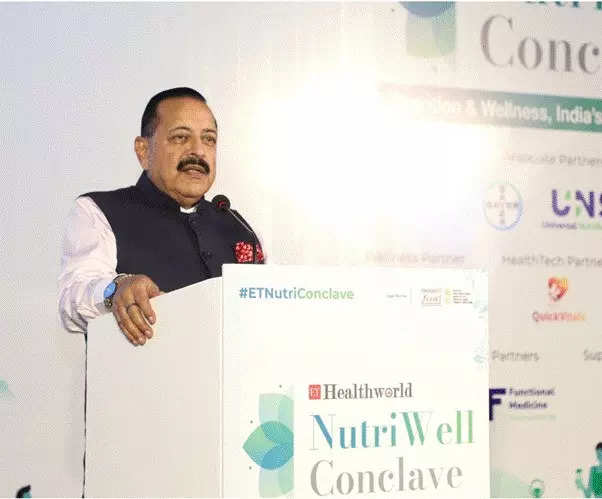
New Delhi: Emphasising the importance of organic food consumption, Dr. Jitendra Singh, Union Minister of State (Independent Charge), Ministry of Science and Technology, stated, “Consumption of organic food, a return to oriental diet culture, and minimal preservative use are the keys to nutritional health.” Speaking at the inaugural edition of ETHealthworld’s Nutriwell Conclave 2024, Dr. Singh urged the adoption of traditional oriental dietary practices and emphasized the need to reduce the use of preservatives.
As health concerns rise, dietary choices are increasingly central to addressing global nutrition challenges. With processed foods dominating modern diets, Dr. Singh stressed the importance of balancing contemporary trends with traditional practices. Embracing organic food, minimally processed diets, and cultural eating habits has emerged as a key strategy for sustainable health.
The Minister noted that reverting to natural, less processed dietary habits can address modern nutritional challenges and promote holistic well-being. He emphasized the need for innovation and sustainability in tackling nutrition challenges, outlining a holistic approach that involves advanced research, collaboration between public and private sectors, and sustainable practices to secure long-term food and nutrition goals.
Reflecting on India’s past health challenges, Dr. Singh highlighted that many issues were rooted in undernutrition, underscoring the importance of adopting healthier dietary patterns.
Speaking about India’s evolving food culture, Dr. Singh said, “Earlier, depending on the particular region of India, dietary patterns could be demarcated, but no longer so. For example, South Indian dishes are now increasingly consumed in North India and vice versa. Likewise, Northeast dishes are becoming popular in other parts of the country. Indians are simultaneously eating Italian pizza and Chinese noodles. Our food culture is evolving, just as our society and nation are evolving at different levels.”
Discussing the uniqueness of Indian dietary patterns and their health impacts, Dr. Singh noted that an Indian’s physical characteristics differ starkly from those of Europeans. He also spoke about the shifting disease patterns in the country, mentioning the emergence of infectious diseases.
Addressing India’s demographic landscape, he called for tailored nutrition standards for different generations and age groups, given the country’s large youth population.
Among the initiatives underway at the Department of Science and Technology, the Minister highlighted the Young Scientist and Technologist Scheme (SYST), a pivotal program empowering innovators under 35. By nurturing breakthrough solutions in nutrition, including developing nutritional supplements and value-added food products for humans and animals, SYST aligns with India’s long-term health and nutrition objectives. Programs like SYST cultivate a generation of problem-solvers equipped to combat malnutrition effectively.
He also spotlighted the National Speed Breeding Crop Facility (NSBC) at the National Agri-Food Biotechnology Institute (NABI). This initiative is advancing the development of climate-resilient, high-nutrient crop varieties through speed-breeding technologies. Such innovations address the impact of climate change on agriculture while meeting the nutritional needs of India’s growing population.
Dr. Singh noted that innovations like these ensure food security and sustainability, contributing significantly to national development goals. He also mentioned the potential of reused cooking oil as a resource for biofuels, contributing to the circular economy.
The Minister stressed the need for collaboration among public institutions, private enterprises, and research organizations to advance innovations in nutrition. He highlighted the importance of supportive policies and funding to develop and adopt scalable solutions, such as biofortified crops and value-added food products.
Underlining the need for a strong regulatory framework, he emphasised that nutritional products introduced to the market must be both safe and effective. A balanced approach to regulation, he noted, can promote innovation while protecting public health and supporting the growth of the nutritional product market.
Dr. Singh also advocated for sustainable and climate-resilient food systems that prioritize locally grown, nutrient-rich foods. He called for efforts to make nutritional solutions more accessible, affordable, and sustainable, ensuring that they benefit all sections of society.
The first edition of ETHealthworld’s Nutriwell Conclave 2024 brought together leading experts, policymakers, and stakeholders to discuss actionable strategies for enhancing health through nutrition.







